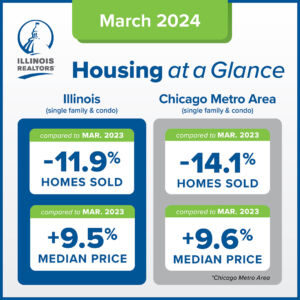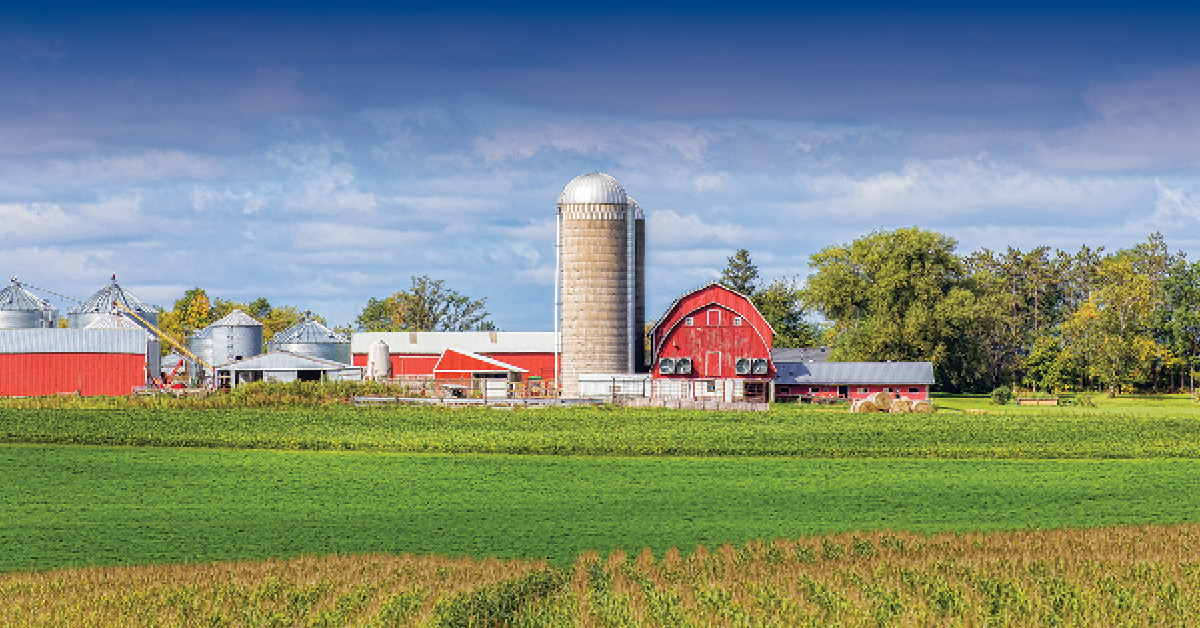Illinois farms are an economic powerhouse, generating more than $19 billion in overall economic impact annually, according to the Illinois Department of Agriculture.
In all, the state has more than 72,000 farms accounting for 27 million acres.

Luke Worrell with Worrell Land Services LLC in Jacksonville is president of the Illinois Farm and Land Chapter of the REALTORS® Land Institute. His firm buys, sells, appraises and manages farms throughout the state, and he discussed with Illinois REALTORS® the current state of agriculture real estate in Illinois.
Illinois REALTORS®: We’ve seen some real ups and downs in farm acreage prices over the past few years. How are farmland prices in 2019 shaping up?
Worrell: We peaked in 2013 and 2014. That’s when we saw some of the most historically high prices. Since that time, we’ve seen very moderate declines – nothing enormous.
I think over the last several years, when the year has wrapped up, we have seen maybe an even stance, in the best case, to a decline of two to five percent. I think most people, when they see the door close on 2019, think we’ll see some very gradual softening on prices.
Illinois REALTORS®: Are tariffs having an impact on farmland prices?
Worrell: They (tariffs) certainly don’t help. I don’t know that they have been catastrophic. You know, it’s a small world we live in now. So, I like to describe it as there is a lot of “noise” out there, and most of it has not been favorable lately.
Land values directly correlate to commodity values. In our state, particularly, the price of corn and soybeans, have not been doing too well. Obviously, that is going to have an effect. I don’t think it has an enormous effect. It probably doesn’t match the “noise” that’s out there.
We’re all hoping for a solution and a bit smoother sailing in the near future.
Illinois REALTORS®: In 2012 there were more than 75,000 farms in the state. Now there are just more than 72,500 farms. What’s accounting for that decrease?
Worrell: There are couple of factors. The average age of a farmer – a landowner – is up there, and more so than in other industries. As farmers retire, there isn’t necessarily the next generation ready, willing and able to take their places.
Farming is a very expensive industry. It’s incredibly hard for a younger person to just decide they are going to be a farmer. You almost have to be set up through a family lineage. The smaller operators have a harder time handling the rough waters.
Illinois REALTORS®: Do the challenges for smaller farmers drive trends toward sales to larger farming operations?
Worrell: We’ve stacked as many as five lean years on top of one another. Obviously, if you are a smaller operator, you might not have the bandwidth to handle a down year, let alone three or four in a row.
I think that has driven some land to larger operations which are better suited and structured to be in it for the long haul.
Illinois REALTORS®: It has been a rough year, weather-wise for farmers. What are they telling you about how this year will play out?
Worrell: Nobody has a great feeling. People are very cautious when they try to project what we are going to have this year. I think we are at the point where people are probably a little nervous to see what the yields are when they come in.
I think everybody is excited to get this year over with, honestly, and keep their fingers crossed for 2020.
Illinois REALTORS®: Are we seeing more foreign investors buying farmland here?
Worrell: Illinois is not as strict as others states (on farmland ownership), so it does open the door for foreign investors. In my area we still have not seen a large influx of foreign buyers. I will say that I have definitely heard more from foreign buyers in the last year or two, but I haven’t seen any deals actually come to fruition.
The changing nature of American agriculture

Dean Cavey
managing partner for
Verdant Partners LLC, a
Champaign-based agribusiness firm
Agriculture is a critically important industry for the U.S. and our home state of Illinois.
Illinois is perennially the second largest producer of corn and soybeans in the country. Agriculture is also critical to the rest of the world since the U.S. has historically been the leader in the export of agricultural products to feed a growing world population that is expected to reach nearly 10 billion people by 2050.
Historians typically refer to three agricultural revolutions since the beginning of recorded history.
The first revolution occurred around 10,000 BC with the transition from hunting and gathering to planting and sustaining.
The second revolution increased the productivity of farming through mechanization and improved transportation.
The third revolution started in the 1930’s with the introduction of hybrid seed corn as well as other practices which allowed for substantially greater output using the same or less land devoted to the production of crop agriculture.
The old saying “knee high by the fourth of July” was undoubtedly coined prior to the introduction of hybrid seed corn.
With this year being an exception, people in the Midwest are accustomed to seeing knee high corn by Memorial Day, or before, with yields regularly exceeding 200 bushels per acre.
This dramatic improvement is due mainly to technology. In fact, it could be argued that a fourth agricultural revolution started about 25 years ago.
The introduction of biotechnology-derived traits in the mid-1990’s, combined with continued improvements in farming implements and access to sophisticated analytics, sometimes referred to as “big data,” have set off another agricultural revolution that greatly benefitted farmers and radically changed the productivity of American agriculture.
Much has been written about genetically-modified organisms or “GMO’s,” but the technology that gave rise to GMO’s has made farmers much more efficient, more environmentally responsible, and allowed for steady increases in yields and productivity while reducing the use of chemical crop protectants.
GMO technology is directed toward improved management of a variety of insects, diseases and weeds, all of which combine to reduce yields and/or crop quality.
Agriculture is naturally innovative, and those companies serving the industry are the source of constantly improving technology that will allow farmers around the world to produce more on less land.
Weather and politics can and do present challenges to farmers, but the long view suggests that with continued advancements in agricultural technology, including biotechnology, it will be possible to adequately feed nearly 10 billion people just 30 years from now.

REALTOR® Alex Ruggieri
REALTOR® Alex Ruggieri, CCIM, CIPS, CRE, SEC, is a contributing editor to Commercial Corner. He is a senior investment advisor with SVN-Ramshaw Real Estate in Champaign.




 Create professional development programs that help REALTORS® strengthen their businesses.
Create professional development programs that help REALTORS® strengthen their businesses.
 Protect private property rights and promote the value of REALTORS®.
Protect private property rights and promote the value of REALTORS®.
 Advance ethics enforcement programs that increase REALTOR® professionalism.
Advance ethics enforcement programs that increase REALTOR® professionalism.
 Protect REALTORS® by providing legal guidance and education.
Protect REALTORS® by providing legal guidance and education. Stay current on industry issues with daily news from Illinois REALTORS®, network with other professionals, attend a seminar, and keep up with industry trends through events throughout the year.
Stay current on industry issues with daily news from Illinois REALTORS®, network with other professionals, attend a seminar, and keep up with industry trends through events throughout the year.







